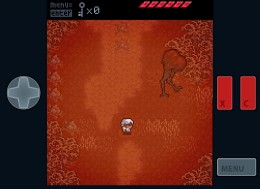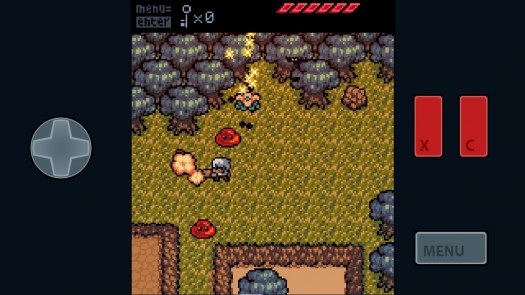 Analgesic Productions’ latest iOS release, Anodyne Mobile ($4.99), is in many ways everything I love about recent Indie-games; often surreal, provoking thought through narrative-commentary, and reflective of the personalities that birthed it. These games should also be engaging, comfortable, and function properly – which sadly Anodyne doesn’t nail-down entirely; remaining a frustratingly-enjoyable experience throughout.
Analgesic Productions’ latest iOS release, Anodyne Mobile ($4.99), is in many ways everything I love about recent Indie-games; often surreal, provoking thought through narrative-commentary, and reflective of the personalities that birthed it. These games should also be engaging, comfortable, and function properly – which sadly Anodyne doesn’t nail-down entirely; remaining a frustratingly-enjoyable experience throughout.
Anodyne’s resemblance to one of the greatest Zelda games rests entirely on perspective and genre, alone. Narratively, this coming-of-age story trades a princess, swords, and magical triangles for a hero named Young, broom-sticks, and the philosophies of David Lynch. The story that unfolds lacks cohesion and interprets the minds of its makers into ominous vignettes, which speaks of much more than a desire to kill the pains of life through video games. Anodyne’s narrative remains intriguing and enjoyable from start to finish, though, even when I wasn’t quite sure what I was being told.
Anodyne gives you a large open-world to explore; collecting keys, cards, and upgrades as you unlock your way through the gates that control the pacing of its adventure. Taking from early Zelda inspirations: the path that leads to what’s next is barely hinted at, effectively leaving the players desires to explore more of The Land as motivation. A hub makes traversing back and forth through Anodyne’s wonderful worlds a simple endeavor, and eases the frustrations of scrolling across near-endless screens.
Dungeons are filled with puzzles, which play into the hands of Anodyne’s dust-sweeping mechanic, but never reach a pinnacle in design. Young can use his broom to sweep up dust and replace that dust somewhere else on screen to his advantage. Dust can also act as a raft or shield in any given situation. There are many dodging and platforming dangers to go along with the numerous enemies that inhabit the screens of Anodyne, as well. Combat is simple and uninspired, serving its purpose between puzzles.
 But the sum of all that makes Anodyne a game I adore isn’t enough to dust aside its biggest misstep: controls. Virtual D-pads have been the bane of iOS game existence since the platform began its uphill battle, and unfortunately remains to be here. Even with a customizable control-layout frustrations ran high through the back half of this 10+ hour adventure. Without iCade support or – better still – a tap-gesture control scheme Anodyne may find itself to be labeled unplayable to some. There was also a sticking issue that occasionally kept me walking into dangers. Comfort never settled in when controlling Young across The Land, and sadly becomes one of the game’s major flaws.
But the sum of all that makes Anodyne a game I adore isn’t enough to dust aside its biggest misstep: controls. Virtual D-pads have been the bane of iOS game existence since the platform began its uphill battle, and unfortunately remains to be here. Even with a customizable control-layout frustrations ran high through the back half of this 10+ hour adventure. Without iCade support or – better still – a tap-gesture control scheme Anodyne may find itself to be labeled unplayable to some. There was also a sticking issue that occasionally kept me walking into dangers. Comfort never settled in when controlling Young across The Land, and sadly becomes one of the game’s major flaws.
Control issues aside: lack of iCloud saves and my desire for more depth through systems is all that’s left to complain about. I rather enjoyed everything else Anodyne had to offer. For starters, its pacing is console-like; never tossing a score-screen, or menu, in your face before dropping you back into its action. The lack of direction made exploration and puzzles engaging, combat – while serviceable – has its boss battle moments, its dialogue mysteriously intriguing, and its worlds diversely enjoyable. Also, its soundtrack keeps with the tones of its visuals, remaining melodic and memorable as much as it’s enjoyable to the ears. Then there is Young’s post-credits ability that changes everything you’ve learned and throws it out the window, graciously.
Sure, Anodyne could not live up to A Link To The Past, but it’s an artistic-take built off the inspirations of that classic, made by 2 aspiring developers with something to say. That’s commendable in my book. I can only hope Sean and Jonathan continue to support their release and polish this effort past its blemishes.
This experience feels intentionally more about its message than the landscape of the genre, and it’s successful at that. That’s not to say that it is not fun, or attempting to be, but in the end I was more intrigued by what the game was saying, than playing. If you’re shaking your head over that statement, consider looking elsewhere for action-adventure.
Analgesic Productions’ latest lends itself more to be played on PC – which it is also available on – falling short in the control department enough to say so. While I myself tend to favorite games with a narrative that transcends the video game soap box it speaks from, not everyone will – leaving them with a game that lacks comforting controls and a story that can be interpreted to be more pretentious than not. Still, for my liking, an artistic attempt in video games is often worthy of its frustrations; especially if iOS is the only platform you have to experience it.

